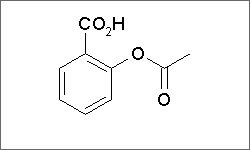Aspirin

Aspirin is an anti-inflammatory (pain and fever reducing) drug available in several generic forms and is also known by the brand names Excedrin® and Bayer Aspirin®. It can be given as a tablet or a liquid, usually several times daily.
Aspirin binds to both the COX1 and COX2 enzymes in the treatment of mild pain.
The structure above shows the 3D conformer Aspirin.
The most common side effects of aspirin are stomach upset, heartburn, and nausea. Because aspirin can lead to stomach irritation, patients with ulcers are more likely to have problems. Allergic reactions to aspirin are much less common but can be severe.
Children and teenagers who have or are recovering from chicken pox or flu-like symptoms should not use this product. When using this product, if changes in behavior with nausea and vomiting occur, consult a doctor because these symptoms could be an early sign of Reye's syndrome, a rare but serious illness. Aspirin may affect clotting times and individuals who are at risk for bleeding should use aspirin with caution. Aspirin usage must be discontinued prior to many medical procedures.
